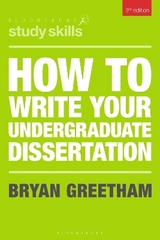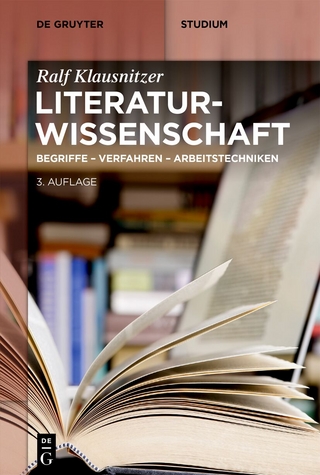
How to Write Your Undergraduate Dissertation
Red Globe Press (Verlag)
978-1-137-38976-3 (ISBN)
- Titel erscheint in neuer Auflage
- Artikel merken
Writing a dissertation is like running a marathon: a successful one takes months of careful planning and preparation. This practical guide takes undergraduate students step-by-step through the process of completing a dissertation, from the initial stages of generating original ideas and planning the project through to writing their first draft and critically reviewing their own work.
It shows students how to choose the most appropriate methods for collecting and analysing their data and how to then integrate this research into their dissertation. Students will learn how to develop consistent and persuasive arguments and write up their research in a clear and concise style.
This book is an essential resource for undergraduates of all disciplines who are required to write a dissertation as part of their degree.
Bryan Greetham was educated at the universities of Kent and Sussex, UK. He holds a PhD in moral philosophy from the University of Newcastle, Australia. He is currently engaged in research into moral thinking and the Holocaust, and teaches philosophy at the University of Maryland. He is the author of How to Write Better Essays, Thinking Skills for Professionals and Philosophy.
Preface.- Acknowledgements.- 1. Introduction.- PART I: EXAMINERS AND SUPERVISORS 2. Examiners – What Are They Looking For?.- 3. Working With Your Supervisor.- PART II: GENERATING AND DEVELOPING ORIGINAL IDEAS 4. What Activities Suit You Best?.- 5. Types of Research.- 6. What Interests You Most?.- 7. Generating Your Own Ideas 1: Using Trigger Questions.- 8. Generating Your Own Ideas 2: Perspectives and Levels.- 9. Developing Your Ideas 1: Causal Relations.- 10. Developing Your Ideas 2: Conceptual Relations.- 11. Original Questions and Hypotheses 1: Using Analogies.- 12. Original Questions and Hypotheses 2: Working With Your Structures.- PART III: DECIDING ON YOUR PROJECT 13. Searching the Literature 1: Knowing What to Look For.- 14. Searching the Literature 2: How to Search.- 15. Choosing the Topic.- PART IV: ORGANISING YOUR WORK 16. Planning Your Research.- 17. Managing Your Time.- 18. Your Retrieval System.- 19. Reading.- 20. Note-taking.- PART V: DOING YOUR RESEARCH 21. Qualitative and Quantitative Research.- 22. Secondary Sources.- 23. Primary Sources 1: Quantitative Research.- 24. Primary Sources 2: Designing and Distributing Your Questionnaire.- 25. Primary Sources 3: Qualitative Research – Interviews and Focus Groups.- 26. Primary Sources 4: Qualitative Research – Case Studies and Observations.- PART VI: PLANNING YOUR DISSERTATION 27. The Main Components and Introduction.- 28. The Literature Review.- 29. Research Methods, Findings, Conclusions and Appendices.- PART VII: ORGANISING YOUR THINKING 30. Developing Consistent Arguments 1: The Components.- 31. Developing Consistent Arguments 2: The Connections.- 32. Using Evidence 1: Describing It.- 33. Using Evidence 2: Drawing Inferences.- 34. Using Evidence 3: Creating Causal Connections.- 35. Using Language 1: Clarity Jargon.- 36. Using Language 2: Clarity Manipulative Words.- 37. Using Language 3: Consistency.- PART VIII: WRITING YOUR DISSERTATION 38. The First Draft.- 39. Style 1: Finding Your Own Voice.- 40. Style 2: Simplicity and Economy.- PART IX: PLAGIARISM, REFERENCING AND BIBLIOGRAPHIES 41. Plagiarism.- 42. Referencing and Bibliographies.- PART X: EDITING Revision 1: The Structure.- Revision 2: The Content.- Conclusion.
| Erscheint lt. Verlag | 13.8.2014 |
|---|---|
| Reihe/Serie | Macmillan Study Skills | Palgrave Study Skills |
| Zusatzinfo | 408 p. |
| Verlagsort | London |
| Sprache | englisch |
| Maße | 138 x 216 mm |
| Gewicht | 517 g |
| Themenwelt | Geisteswissenschaften ► Sprach- / Literaturwissenschaft ► Literaturwissenschaft |
| Sozialwissenschaften ► Pädagogik ► Allgemeines / Lexika | |
| ISBN-10 | 1-137-38976-1 / 1137389761 |
| ISBN-13 | 978-1-137-38976-3 / 9781137389763 |
| Zustand | Neuware |
| Haben Sie eine Frage zum Produkt? |
aus dem Bereich



